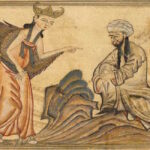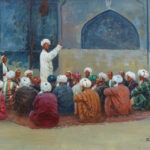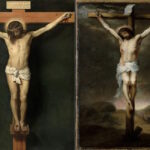Was Muhammad a Prophet of God?
Muhammad’s Miracles vs Biblical Miracles
Contradictions Between the Bible and Quran
Violence in the Quran and Hadith vs the Bible
Reasons to Question Islam and Muhammad's Prophethood
Contrasting Moral Behavior of Jewish Prophets and Muhammad
Jewish prophets such as Moses, Samuel, and Elijah were devoted to spiritual guidance and ethical conduct, steering clear of military roles and personal gain. In contrast, Muhammad integrated religious leadership with military strategy, leading battles and benefiting personally from war booty and multiple marriages. While Jewish prophets strictly adhered to divine commandments and moral principles, Muhammad’s revelations included personal advantages, highlighting distinct moral and ethical traditions in Judaism and Islam. Read more...
Can Muhammad, Who Never Directly Spoke with God, Truly Be Considered a Prophet of God?
Moses, Samuel, Elijah, Isaiah, Jeremiah, Jonah. These prophets are known for their direct and personal interactions with God, each experiencing divine communication in distinct ways that affirmed their authority. In contrast, Muhammad received revelations through the angel Gabriel rather than direct communication with God. This distinction raises questions about the authenticity of his prophetic messages, as traditional views emphasize direct divine interaction as a key indicator of true prophecy. Read more...
Did Muhammad Perform Miracles? A Comparison with Biblical Figures
Islamic tradition claims that Muhammad did not perform physical miracles when asked, unlike figures such as Moses and Jesus, who demonstrated divine authority through miraculous acts. Despite demands from his contemporaries, Muhammad relied solely on delivering the Qur’an, which Muslims consider the ultimate miracle for its linguistic beauty and spiritual guidance. However, contradictions between the Qur’an's claim of no miracles and Hadith reports attributing miracles to Muhammad raise questions about the reliability of Islamic texts. Read more...
Islam’s Foundation: The Problem with Relying on a Single Testimony
Islam’s foundation rests on Muhammad’s single testimony of his encounter with the angel Gabriel, which marks the beginning of its teachings. This reliance on one testimony contrasts with historical norms, such as Jewish and Christian traditions, where multiple witnesses were required to establish credibility, as seen in the Bible. Even Islamic law demands multiple witnesses for legal matters. In contrast, Jesus’ claims were validated by prophetic predictions, miracles, and other testimonies. This inconsistency raises questions about Islam's foundational credibility when compared to other religious traditions. Read more...
Surah 9:29, Implications for Muhammad's Prophetic Legitimacy and the Role of Jizyah in Islamic Tradition
Surah 9:29 of the Quran instructs Muslims to "fight those who do not believe in Allah" and to impose the jizyah tax on non-Muslims, particularly Jews and Christians, as a form of subordination. This verse, found in Surah At-Tawbah, has sparked debate regarding its historical context and implications for Muslim and non-Muslim relations. While some Islamic scholars interpret it as a defensive measure during conflicts, critics argue it raises questions about Muhammad's role as a prophet, suggesting that accepting a tax for religious tolerance undermines the uncompromising mission expected of true prophets. The contrasting approach of biblical prophets, who faced adversity without such compromises, highlights the tension between religious authority and political power, leading some to question Muhammad’s prophetic legitimacy. Read more...
Understanding Surah 65:4, Implications of Sexual Relations with prepubescent girls
Surah 65:4 of the Qur’an discusses the waiting period (iddah) after divorce and specifically mentions girls who “have not yet menstruated.” This reference raises significant concerns, as it implies that the waiting period applies to those who have not reached puberty, potentially including prepubescent girls. This suggests that the verse addresses not only marriage but also the implications of sexual relations, as the waiting period serves to determine paternity and establish lineage in cases of pregnancy. The verse highlights ethical questions surrounding child marriage and sexual maturity in Islamic law. Read more...
The Permissibility of Wife Beating in Islam: An Analysis of Surah An-Nisa (4:34)
Surah An-Nisa (4:34) is a pivotal verse in Islamic discourse, focusing on gender roles and authority within the family. It states that men are responsible for women due to their financial and protective roles. The verse emphasizes qualities of righteous wives who are obedient and safeguard their husband's property. It outlines steps for addressing a wife's disobedience: advising her, withdrawing from intimacy, and, as a last resort, using physical discipline. Read more...
Reconciliation After Triple Talaq: The Social and Emotional Costs for Women
Although technically reversible, reconciliation after Triple Talaq incurs significant emotional and social costs, particularly for women. According to Islamic law, after a man divorces his wife three times, she becomes unlawful to him unless she marries another man, consummates the marriage, and is subsequently divorced by him. This sequence is necessary for her to lawfully return to her first husband, as outlined in Surah Al-Baqarah (2:230). The halala process is often controversial and can be emotionally taxing and socially stigmatizing for women. Read more...
Comparing the Holiness of God and Allah
Another key difference lies in the concept of holiness. In Christianity, God's holiness is an attribute that fundamentally shapes His relationship with sin. God loves sinners but detests sin, offering forgiveness and redemption while upholding moral standards. On the other hand, in Islam, holiness is not emphasized in the same way. Allah's relationship with sin is more about adherence to divine law rather than a personal struggle with the concept of sin itself. Allah's response to sin appears more detached, focusing on obedience and punishment rather than personal redemption. Read more...
God the Father vs. Allah the Master
The God of Israel and Allah are understood differently in Christianity and Islam, reflecting profound differences in their nature and relationship with humanity. In Christianity, God is seen as a loving Father who embraces believers as His children. This relationship emphasizes personal intimacy and love, with Christians viewing themselves as beloved children of God. In contrast, Allah in Islam is often regarded as a distant Master, with Muslims seeing themselves as servants or slaves to Allah. This perspective highlights a more hierarchical and less personal relationship. Read more...































